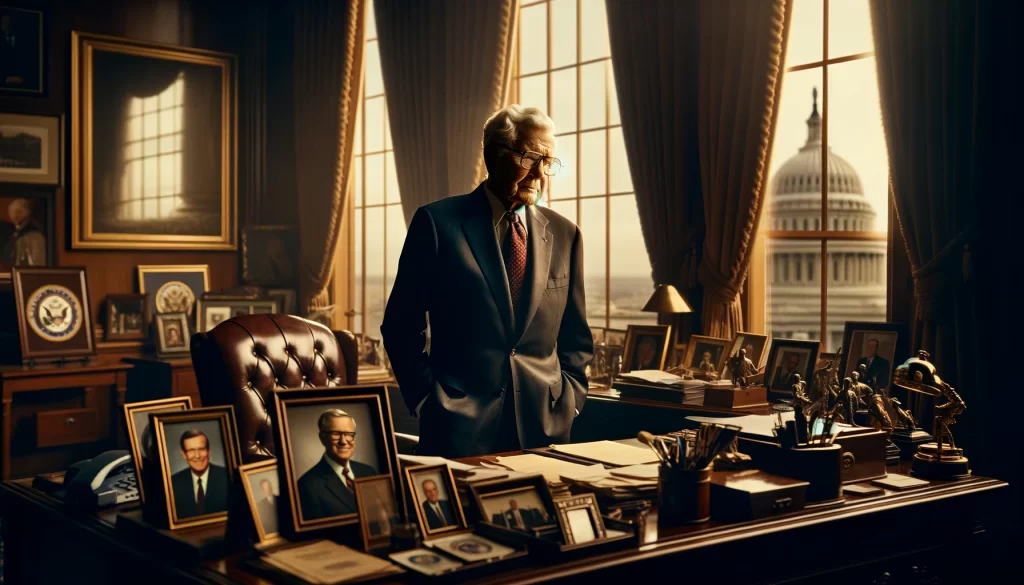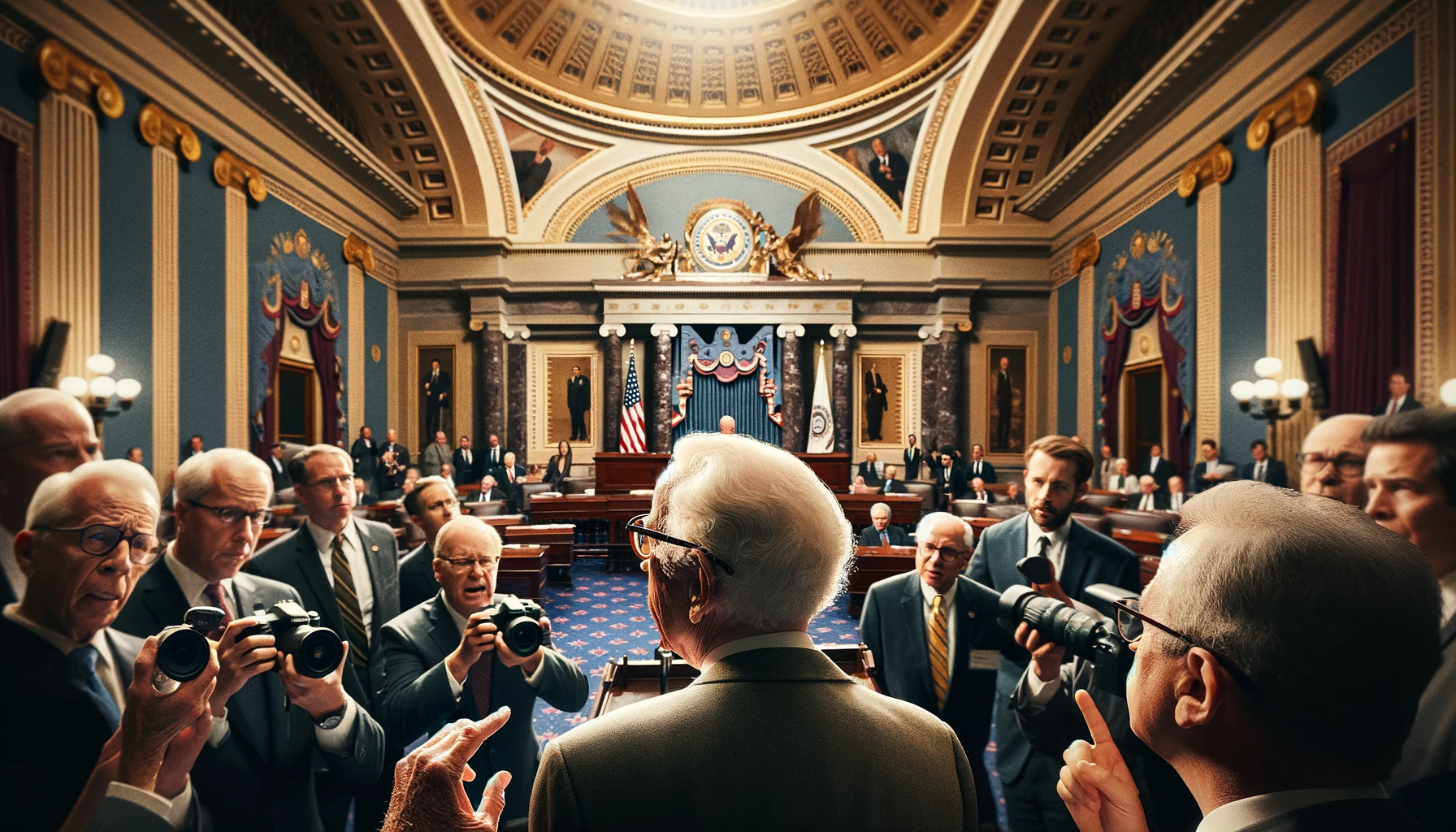When Mitch McConnell, a seasoned politician from Kentucky, announced he wouldn’t run again for the role of Senate Republican leader, he mentioned it was time for new leadership. For many, this change was overdue. Known as “Old Crow” by Donald Trump, a nickname inspired by a budget-friendly bourbon from Kentucky, McConnell had become somewhat of an outdated figure in a party that was rapidly embracing Trump’s unique style of leadership, which mixed a strong nationalistic approach with a break from traditional conservative values.
McConnell’s decision to step down came at a time when the Republican Party was clearly moving away from its old ways, as seen in the presidential primaries. Candidates who represented the party’s traditional values, like former Vice President Mike Pence, Senator Tim Scott from South Carolina, and Nikki Haley, a former U.N. Ambassador, found little favor among GOP voters. McConnell’s departure marks a significant shift, indicating a final move away from the Republican Party as it was known in the past.
Senator Mike Braun from Indiana, who supported Rick Scott from Florida in the last leadership election, highlighted that McConnell’s leadership lacked appreciation for what Trump represented. According to Braun, Trump resonated with a significant portion of Americans who were disillusioned with the political establishment. Braun believes the new leader must understand and embrace this sentiment.
McConnell was known for his refined Southern manners and a strategic, almost Machiavellian approach to politics, combined with a deep understanding of Senate procedures. However, these qualities were no match for Trump’s direct and forceful style. Interestingly, McConnell chose not to use the Senate’s impeachment process to challenge Trump, a decision that may have contributed to his declining influence in the party.
Trump’s ascendancy in the GOP wasn’t just about surpassing McConnell; it was a broader repudiation of the party’s traditional, more elitist establishment. Trump’s rise to power involved defeating prominent political families and figures, signaling a dramatic transformation within the Republican Party. The upcoming Senate Republican leadership is expected to be more aligned with Trump’s ideology, reflecting a significant change in the party’s direction.
Senator Braun pointed out that most of the new Republican senators elected since 2018 support a new approach in Washington, D.C., indicating a shift away from the old Republican ways, a shift that McConnell seemed to resist. Braun warned that any future leader who ignores this trend is likely misjudging the party’s direction.

The relationship between McConnell and Trump was complex, marked by public disagreements and personal attacks. Despite their differences, there were moments when McConnell supported Trump’s agenda, showing a complicated dynamic between traditional conservatism and Trump’s new direction for the GOP.
In the end, McConnell’s decision to step aside is seen as an acknowledgment of the changing times and the rise of Trump’s influence within the Republican Party. McConnell’s career, characterized by political resilience, ultimately concluded with a concession to the new reality of his party, much like a fine Kentucky bourbon yielding to the passage of time.
This article is based on the following article:

Background Information
By understanding these background elements, the reader can better comprehend the significance of McConnell stepping down and the broader implications for the Republican Party’s future direction. This change reflects not just a leadership transition but also a pivotal moment in the evolving identity of the party.
1. Mitch McConnell
Mitch McConnell is a veteran politician from Kentucky who has served as the Senate Republican leader. Known for his strategic thinking and deep understanding of Senate procedures, McConnell has been a significant figure in American politics. His leadership style represents traditional conservatism, emphasizing fiscal responsibility, strong national defense, and limited government intervention.
2. Donald Trump
Donald Trump, the 45th President of the United States, brought a populist approach to the Republican Party. Populism emphasizes the idea that society is divided into two groups at odds with each other – “the pure people” and “the corrupt elite,” and Trump’s policies and rhetoric often reflected this viewpoint. Trump’s leadership marked a departure from traditional conservative principles, focusing more on nationalism, anti-immigration policies, and challenging the status quo of the political establishment.
3. The Republican Party’s Shift
The Republican Party, traditionally associated with conservative values such as free market principles, individual liberty, and a cautious foreign policy, has experienced a significant transformation. The rise of Donald Trump and his populist ideas has shifted the party’s focus towards more nationalist, protectionist policies, and a confrontational style of politics. This shift represents a move away from the “Reaganism” associated with Ronald Reagan, which emphasized small government, free markets, and anti-communism.
4. Key Terms and Concepts
– Internationalism vs. Populism: Internationalism in politics refers to a nation’s involvement in international affairs, promoting global cooperation. Populism, on the other hand, often focuses on national interests and can be skeptical of international institutions and agreements.
– Conservatism: A political philosophy that values tradition, order, and stability, advocating for minimal changes in society. It emphasizes individual responsibility, limited government, and free market economics.
– Impeachment: A process in U.S. politics used to charge, try, and remove public officials for misconduct. McConnell had the opportunity to use this process against Trump but chose not to.
– Senate Procedure Mastery: McConnell’s reputation for understanding and utilizing Senate rules and procedures to advance or block legislation, showcasing his strategic legislative skills.
5. Understanding the Characters and Dynamics
– McConnell and Trump Relationship: The relationship between McConnell and Trump has been complex, marked by periods of cooperation and conflict. McConnell’s conservative leadership style often clashed with Trump’s populist approach, leading to tensions within the party.
– GOP’s Future Direction: The article discusses the potential future direction of the Republican Party, suggesting a continued shift towards Trump’s style of populism. This reflects broader trends within the party and among its voter base, moving away from traditional conservatism.
Please subscribe to Insight Fortnight, our biweekly newsletter!
